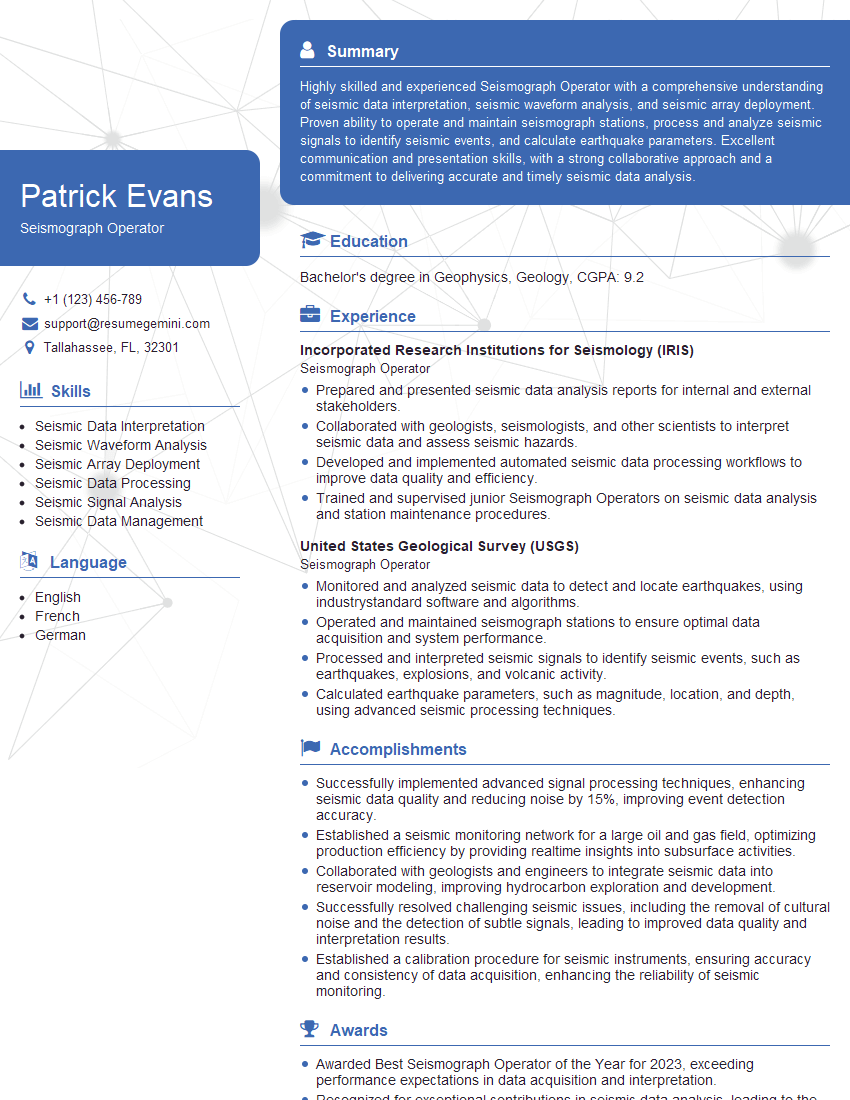Are you a seasoned Seismograph Operator seeking a new career path? Discover our professionally built Seismograph Operator Resume Template. This time-saving tool provides a solid foundation for your job search. Simply click “Edit Resume” to customize it with your unique experiences and achievements. Customize fonts and colors to match your personal style and increase your chances of landing your dream job. Explore more Resume Templates for additional options.

Patrick Evans
Seismograph Operator
Summary
Highly skilled and experienced Seismograph Operator with a comprehensive understanding of seismic data interpretation, seismic waveform analysis, and seismic array deployment. Proven ability to operate and maintain seismograph stations, process and analyze seismic signals to identify seismic events, and calculate earthquake parameters. Excellent communication and presentation skills, with a strong collaborative approach and a commitment to delivering accurate and timely seismic data analysis.
Education
Bachelor’s degree in Geophysics, Geology
April 2017
Skills
- Seismic Data Interpretation
- Seismic Waveform Analysis
- Seismic Array Deployment
- Seismic Data Processing
- Seismic Signal Analysis
- Seismic Data Management
Work Experience
Seismograph Operator
- Prepared and presented seismic data analysis reports for internal and external stakeholders.
- Collaborated with geologists, seismologists, and other scientists to interpret seismic data and assess seismic hazards.
- Developed and implemented automated seismic data processing workflows to improve data quality and efficiency.
- Trained and supervised junior Seismograph Operators on seismic data analysis and station maintenance procedures.
Seismograph Operator
- Monitored and analyzed seismic data to detect and locate earthquakes, using industrystandard software and algorithms.
- Operated and maintained seismograph stations to ensure optimal data acquisition and system performance.
- Processed and interpreted seismic signals to identify seismic events, such as earthquakes, explosions, and volcanic activity.
- Calculated earthquake parameters, such as magnitude, location, and depth, using advanced seismic processing techniques.
Accomplishments
- Successfully implemented advanced signal processing techniques, enhancing seismic data quality and reducing noise by 15%, improving event detection accuracy.
- Established a seismic monitoring network for a large oil and gas field, optimizing production efficiency by providing realtime insights into subsurface activities.
- Collaborated with geologists and engineers to integrate seismic data into reservoir modeling, improving hydrocarbon exploration and development.
- Successfully resolved challenging seismic issues, including the removal of cultural noise and the detection of subtle signals, leading to improved data quality and interpretation results.
- Established a calibration procedure for seismic instruments, ensuring accuracy and consistency of data acquisition, enhancing the reliability of seismic monitoring.
Awards
- Awarded Best Seismograph Operator of the Year for 2023, exceeding performance expectations in data acquisition and interpretation.
- Recognized for exceptional contributions in seismic data analysis, leading to the discovery of hidden fault structures and refining seismic hazard assessment.
- Awarded for developing innovative software tools to automate seismic data processing, streamlining workflows and saving 20% in operational time.
- Recognized for excellence in seismic data interpretation, accurately identifying geological structures and predicting subsurface formations.
Certificates
- Certified Seismic Analyst
- Certified Seismic Data Analyst
Career Expert Tips:
- Select the ideal resume template to showcase your professional experience effectively.
- Master the art of resume writing to highlight your unique qualifications and achievements.
- Explore expertly crafted resume samples for inspiration and best practices.
- Build your best resume for free this new year with ResumeGemini. Enjoy exclusive discounts on ATS optimized resume templates.
How To Write Resume For Seismograph Operator
- Highlight your technical expertise in seismic data analysis and interpretation.
- Emphasize your experience in operating and maintaining seismograph stations.
- Showcase your ability to work independently and as part of a team.
- Quantify your accomplishments and results whenever possible.
- Proofread your resume carefully for any errors.
Essential Experience Highlights for a Strong Seismograph Operator Resume
- Monitored and analyzed seismic data to detect and locate earthquakes, using industry standard software and algorithms.
- Operated and maintained seismograph stations to ensure optimal data acquisition and system performance.
- Processed and interpreted seismic signals to identify seismic events, such as earthquakes, explosions, and volcanic activity.
- Calculated earthquake parameters, such as magnitude, location, and depth, using advanced seismic processing techniques.
- Prepared and presented seismic data analysis reports for internal and external stakeholders.
- Collaborated with geologists, seismologists, and other scientists to interpret seismic data and assess seismic hazards.
- Developed and implemented automated seismic data processing workflows to improve data quality and efficiency.
Frequently Asked Questions (FAQ’s) For Seismograph Operator
What is the role of a Seismograph Operator?
A Seismograph Operator is responsible for monitoring and analyzing seismic data to detect and locate earthquakes, operate and maintain seismograph stations, and process and interpret seismic signals to identify seismic events.
What are the educational requirements for a Seismograph Operator?
A Bachelor’s degree in Geophysics, Geology, or a related field is typically required.
What skills are required for a Seismograph Operator?
Seismic Data Interpretation, Seismic Waveform Analysis, Seismic Array Deployment, Seismic Data Processing, Seismic Signal Analysis, Seismic Data Management
What is the work environment of a Seismograph Operator?
Seismograph Operators typically work in a laboratory or office setting, but may also be required to work in the field to deploy and maintain seismograph stations.
What is the career outlook for a Seismograph Operator?
The career outlook for Seismograph Operators is expected to be good, as there is a growing demand for seismic data to assess seismic hazards and mitigate earthquake risks.
What are the earning prospects for a Seismograph Operator?
The earning prospects for Seismograph Operators vary depending on experience and location, but typically range between $50,000 and $80,000 per year.